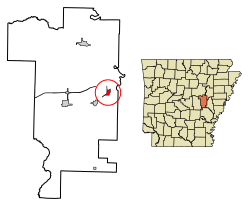Fredonia (Biscoe), Arkansas facts for kids
Quick facts for kids
Fredonia (Biscoe), Arkansas
|
|
|---|---|

Location of Fredonia (Biscoe) in Prairie County, Arkansas.
|
|
| Country | United States |
| State | Arkansas |
| County | Prairie |
| Area | |
| • Total | 0.95 sq mi (2.47 km2) |
| • Land | 0.95 sq mi (2.47 km2) |
| • Water | 0.00 sq mi (0.00 km2) |
| Elevation | 190 ft (60 m) |
| Population
(2020)
|
|
| • Total | 305 |
| • Density | 319.37/sq mi (123.26/km2) |
| Time zone | UTC-6 (Central (CST)) |
| • Summer (DST) | UTC-5 (CDT) |
| ZIP code |
72017
|
| FIPS code | 05-25060 |
| GNIS feature ID | 2406523 |
Fredonia (Biscoe) is a small city in Prairie County, Arkansas, in the United States. In 2020, about 305 people lived there. It is often known by both names, Fredonia and Biscoe, which have interesting stories from its past.
Contents
History of Fredonia (Biscoe)
The name "Fredonia" comes from a local story. It's said to be linked to the Republic of Fredonia movement. This movement happened in Mexican Texas in the 1820s. A group of Cherokee people from Arkansas, who had settled near Nacogdoches, Texas, wanted to create their own independent Native nation. They had support from white settlers from the southern U.S. However, this dream ended in a fight with Mexican troops.
The name "Biscoe" was the official name for the town for most of its history. It was founded in the 1810s. Thousands of Cherokee settlers from Tennessee moved to this area. It was a piece of land set aside for the Western band of Cherokee. But they lost their independence when Arkansas became a state in 1836.
Over time, many African-American people came to live in Biscoe. This was due to the history of farming and labor in the area. Today, African Americans make up a large part of the community.
Geography of the City
Fredonia (Biscoe) is located in Prairie County. According to the United States Census Bureau, the city covers about 2.4 square kilometers (0.95 square miles) of land. There is no water area within the city limits.
Population and People
| Historical population | |||
|---|---|---|---|
| Census | Pop. | %± | |
| 1920 | 310 | — | |
| 1930 | 402 | 29.7% | |
| 1940 | 395 | −1.7% | |
| 1950 | 406 | 2.8% | |
| 1960 | 350 | −13.8% | |
| 1970 | 340 | −2.9% | |
| 1980 | 486 | 42.9% | |
| 1990 | 484 | −0.4% | |
| 2000 | 476 | −1.7% | |
| 2010 | 363 | −23.7% | |
| 2020 | 305 | −16.0% | |
| U.S. Decennial Census 2014 Estimate |
|||
The population of Fredonia (Biscoe) has changed over the years. In 2000, there were 476 people living in the town. By 2010, the population was 363, and in 2020, it was 305.
Who Lives in Fredonia (Biscoe)?
In 2000, about 58% of the people in Fredonia (Biscoe) were Black or African American. About 41% were White. A very small number of people were of two or more races.
The town had 176 households in 2000. About 34.7% of these households had children under 18 living there. The average household had about 2.7 people. The average family size was about 3.26 people.
The age of the people in town varied. About 29.6% were under 18 years old. About 16.2% were 65 years or older. The average age in the town was 36 years old.
The median income for a household in 2000 was $21,406. This means half of the households earned more than this, and half earned less. About 27% of the population lived below the poverty line. This included about 34.3% of those under 18.
Education
Students in Fredonia (Biscoe) go to public schools provided by the Hazen School District. This district operates Hazen High School for older students.
See also
 In Spanish: Fredonia (Biscoe) (Arkansas) para niños
In Spanish: Fredonia (Biscoe) (Arkansas) para niños
 | John T. Biggers |
 | Thomas Blackshear |
 | Mark Bradford |
 | Beverly Buchanan |

